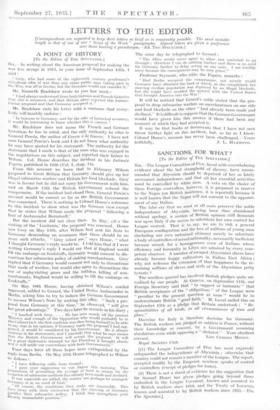LETTERS TO TI1E EDITOR
[coriespondents are requested to keep their letters as brief as is reasonably possible. The most suitable length is that of one of our " News of the Week" paragraphs: Signed letters are given a preference over those bearing a pseudonym.—Ed. THE SPECTATOR.]
A POINT OF HISTORY
[To the Editor of TILE SPECTATOR.]
writing about the American proposal for making the war less savage in 1915, in your issue of September lath, I said Grey, who had more of the eighteenth century gentleman's idea of war than any other public man taking part in the 4Var,ivas all in favour, but the Germans would not consider it."
Mr. Kenneth Bradshaw wrote to you last week :
" I had always 'understood from both German and French histories that this is incorrect, and that Britain alone rejected this human- itarian proposal, and that Germany accepted it."
Mr. Bradshaw ends his letter with a sentence that every- body will heartily endorse : " In fairness to Germany, and for the sake of historical accuracy, it would be interesting to know whether this is correct."
• Mr. Bradshaw does not name the French and German historians he has in mind, and the only authority he cites is General Percin, the author of Guerre a la Guerre. I have not seen General Perein's book and I do not know what authority he may have quoted for his statement. The authority for the statement that I made is that of the man who was engaged in the negotiations on this subject, and reported their failure to Wilson. Col. House describes the incident in his Intimate Papers, publiShed in 1926 (Vol. 1, chap. 14). From this account we learn that in February Wilson Proposed to. Great Britain that Germany Should give up her illegal submarine warfare and Britain her food blockade. Grey was in favour but he did not carry his Government with him, and on March 15th the British Government refused the Compromise. If the incident had closed then, General Perein's account would be correct so far as the British Government Was concerned. There is nothing in Colonel House's reference to this incident to show what was the German view except that he states that Wilson made the proposal ", following a hint, of Ambassador Bernstorff." But the incident did not close then. In May, after the sinking of the Lusitania,' the proposal was renewed. House saw Grey on May 14th, after Wilson had sent his Note to Germany demanding an assurance that there should be no more such attacks. " Grey asked me," says House, " what I thought 6ermany's reply would be. I told him that if I were Writing Germany's reply I would say that if England would lift the embargo on foodstuffs, Germany would consent to dis- continue her submarine policy of sinking merchantmen. Grey replied that if Germany would consent not only to discontinue that mode. of warfare, but would also agree to discontinue the use of asphyxiating gases and the ruthless killing of non- combatants, England would be willing to lift the embargo on foodstuffs."
On May 19th House, having obtained Wilson's cordial approval, cabled to Gerard, the United States Ambassador in Berlin, asking him to try to induce the German 'Government to answer Wilson's Note by Making this offer. " Stroh a Pro- Posal from. Germany at this time," he observed,'" will give her great advantage:" TwO days later he records in his diary : 1 lunched with Grey. . . . Ho has seen nearly all the present Ministry and enough of the Opposition who Would probably be in the Cabinet [n.b. the first coalition was then being formed] to be able ut, say that in his opinion, if Germany made the proposal I had sug- gested., it would be considered by his Government. He is always cautious in his statements, andconelude that what he says means that the British Government Will accept the 'Proposal. It ' will be a great diplomatic triumph for the President if brought about, anti it•will setae our contentions with both Governments." • Four days later all these hopes were extinguished . by the reply.from Berlin. On May 25th House telegraphed to Wilson
as follows • • " I. have. following cable from Gerard ; .
• " 1 gave .your suggestion to von Jagow this 'periling.. This PropoSition of permitting the presage of food in return for the cessation'astibreafine tnethods'has already beim made and declined. If raw materials aro added, the matter can perhaps be arranged.
Gerniany.is in no need of food." •
does Of course, the conditions they make aro impossible. This 9ces away with their contention that the starving of Germany tustities their submarine policy: I 'think this strengthens your already unassailable position." The same day he telegraphed to Gerard :
" The Allies would never agree to allow raw materials to, go
through ; therefore I can do nothing further grave." said eere is no need Germany further to delay acting on our note. . I am terribly
sorry because the consequences may Professor Seymour, who edits the Papers, remarks •: " Had Berlin accepted the compromise, not merely would Germany have obtained the food of which, as she complained, her
starving civilian population was deprived by an illegal blockade,
but she might have avoided the quarrel with the United States that brought America into the War." r
It will be noticed that Gerard's cable stated that the pro- posal to drop submarine warfare on merchantmen on one side and food blockade on the other " had already been made and declined." It is difficult to suppose that the German Government Would have given hirn this answer if there had been any moment at which they had accepted it.
It may be that books or documents that I have not seen throw further light on this incident, but, so far as I know, Colonel House's account has never been challenged.—YOurs














































 Previous page
Previous page